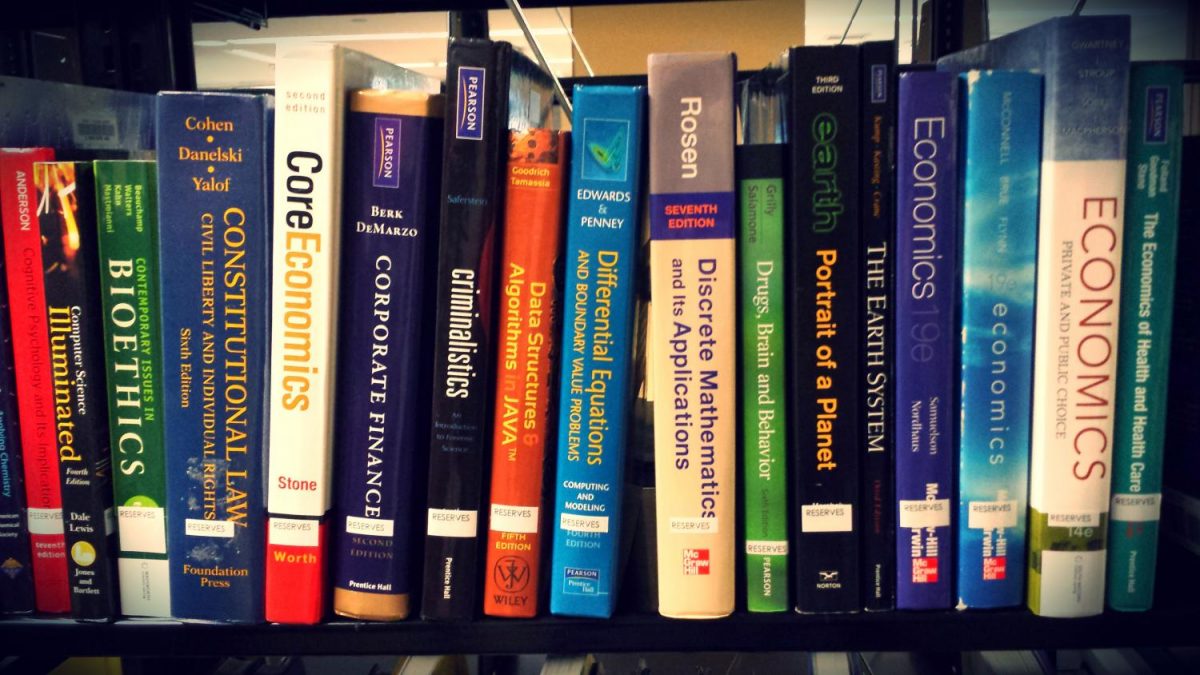Why We Shouldn’t Buy Textbooks
September 24, 2017
University School’s mission statement begins with the sentence, “University School inspires boys of promise to become young men of character who lead and serve.” However, the school’s financial agenda is impeding cetain students from reaching this standard.
Everyone has heard it before; we all know that University School makes obscene amounts of money. From all the endowments, to student tuition, to various fundraisers, University School has a ton of cash that could be used towards bettering its students’ educational experience. Don’t get me wrong, I understand that US dedicates a lot of its fortune specifically to the student body. We have wonderful advantages such as nice lab equipment, high-tech projectors, and hot lunches to ensure that students are primed to achieve their goals.
Unfortunately, while we may have access to several favorable resources, for some, it isn’t enough. Indeed, the most profound example is that the school forces students to purchase expensive textbooks at astronomical prices. Coming from an average middle-class background, the tuition alone was a huge burden on my family’s finances. It became even worse when we found out that we had to purchase a large number of books for the year, unlike public schools where books are loaned to students for the year. In fact, I personally had to spend over $300 my freshman year in to get all the books I needed, which is absolutely absurd.
Of course, this is not to mean that the school is not accommodating for families that have tight financial circumstances, but it is outrageous that students are required to spend that much on textbooks when the tuition alone is already thirty-thousand dollars a year.
This gets even worse when some teachers neglect textbooks, or just use them as an easy way to give homework assignments. For example, I cannot even remember a time when I had to use my Algebra II book during a class period. Now the book sits on my shelf, slowly wasting away.
The school is very financially capable of buying textbooks to loan to students, but I guess it is more important that a large sum of money goes to maintaining things such as a fish tank that is supposed to somehow “contribute to the educational environment.”
I understand that University School is not only a private institution but a business as well. This however, does not mean that the school should not be willing to provide textbooks to its students.
Giving loaner textbooks to students solves a few large issues. First, students would no longer be as heavily financially burdened. Without expensive textbooks to purchase, families would be saving a lot more money that they could be using for other things, maybe even donating back to the school.
Second, loaning textbooks solves the problem of students purchasing incorrect editions of textbooks. I have personally witnessed students accidentally purchasing the incorrect edition of a book, making it impossible for them to accurately follow reading assignments.
Recently, a fellow student in my chemistry class was concerned about the fact that he had received a teacher’s edition of his chemistry textbook. He was afraid that he would be required to purchase another copy of the student textbook, financially hurting him and his family. With the loaner textbooks, situations like this would never have to occur. Students could focus more on learning and be less distracted by trivial things such as, “What page corresponds to my copy of the book?”. Additionally, if teachers choose to not use or rely on the textbook to teach, students are not in a position where they feel they have wasted money on a book.
Finally, providing textbooks to students would even allow them to learn about responsibility – one of the virtues that our institution is built upon. Students given a loaner textbook would have to learn to be responsible for the book’s well-being. If a student is unable to do so, then he must take responsibility and compensate for the book that he has ruined.
Now is the best time for this adjustment to occur because the school is making large changes to students’ curriculum. Eliminating the need for students to purchase their own textbooks would allow for many of the problems of the current system to be fixed. This will help to achieve the mission statement of the school, as students will be more fit to lead and more fit to serve when they can actually focus on their education, without worrying about their financial situations or what Mr. Johnston is going to say about their chemistry books.


David Dimmadome • Sep 25, 2017 at 9:25 am
Every school has hot lunches, sufficient lab equipment, and classroom projectors. While it’s true that our hot lunches are kinda nice, they’re not as nice as less-expensive schools nearby and they’re barely any nicer than even some public schools. While it’s true that we have some more expensive lab equipment than other schools, how much does it really benefit the student body to have a shinier version of something that does the same task? And as for the equipment we have that other schools don’t, it’s usually so specialized to a field and so heavily protected by the school that only a small fraction of us will actually even use it. The fact that you even mentioned classroom projectors is in itself a great example of the financial absurdity of this school. Projector screens have been standard in classrooms in our country for more than ten years. My first grade class at a middle of the road public school had a smart board in it. It’s totally ridiculous to point to our projector screens and say, “Look how lucky we are!” when literally any other school we would attend has the same advantages.